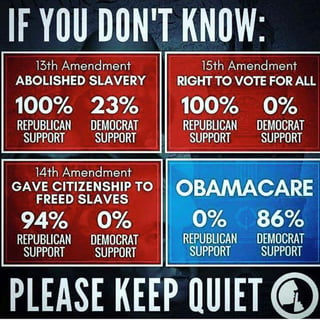Some of the text on this infographic is correct but some is false. A mixed bag.
I didn't verify every claim on the infographic, just the claims I found interesting or were not going to be time prohibitive for me to verify. Party affiliation was checked using Wikipedia and then I checked the Library of Congress' record for the Senator or Representative when their verification was absolutely needed.
Voting results for all of Congress:
13th Amendment
The claim seems to be true for Republican support. No Republicans voted against passing the 13th Amendment in all of Congress.
14th Amendment
The percentage for Republican support is true at least for support in the Senate, I spot check the House and found at least one Republican that voted against the motion in addition.
15th Amendment
The claim is not true for Republicans support in the Senate. There were at least five Republicans that voted against the motion. One such Republican is James Dixon of Connecticut.
In the Senate, Saulsbury(D) of Delaware was marked as absent, not sure if this mean physically missing or abstained from voting. 0% support is possible.
Affordable Healthcare Act (Obamacare)
This bill had total support at introduction in the House. Got mucked with in the Senate and had full backing by Democrats in the Senate revision. The exact number is the House approval of revisions by the Senate not necessarily the total support by all of Congress. However, in any light, Republicans after introduction into the Senate were set against in entirety.
As many have pointed out the Democrats and Republicans of any given time period are going to be of their time and culture. Culture changes and politics is very much a beast of culture, it is not surprising that party platforms change over time.
There is a reason why terms like Southern Democrat and Dixiecrat existed. (If any knows any Republican analogs please comment, I cannot think of any offhand.)

